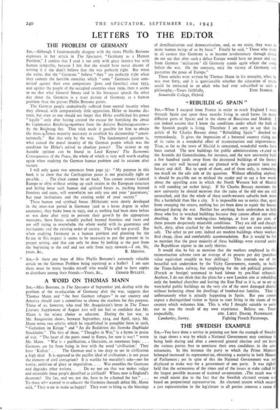A WORD ON THOMAS MANN
SIR,—Miss Bottome, in The Spectator of September 3rd, dealine with the problem of the re-education of Germany after the war, suggests that Thomas Mann and " the best German refugees " in our country and America should start a committee to choose the teachers for this purpose. Those of us, however, who read Mr. Araquistain's letter in The Times Literary Supplement of August 21st will not feel so confident that Mr. Mann is the wisest choice as educator. During the last war, as Mr. Araquistain shows, between September, 1914, and April, 1915, Mr. Mann wrote two articles which he republished in pamphlet form in 1916, " Gedanken im Kriege " and " An die Redaktion des Svenska Dagbladet Stockholm." The first of these, " Thoughts in War," is a hymn in praise of war. " The heart of the poets stood in flames, for now is war! " wrote Mr. Mann. " War in a purification, a liberation, an enormous hope. . . . Germans are far from being in love with the word ' civilisation.' They
have Kultur.' . . The German soul is too deep to see in civilisation a high ideal It is opposed to the pacifist ideal of civilisation ; is not peace the element of civil corruption? It is warlike for morality's sake—not for vanity, ambition of glory or imperialism. . .. War ennobles the Germans and degrades other nations. . . Do we not see that war makes vulgar and miserable those people described as civilised? Where now is England's decorum? She lies, and we, not she, have to be ashamed for her." . . . To those whn wanted to re-educate the Germans through defeat Mr. Mann said, "They want to make us happy! They want to bring us the blessings of demilitarisation and democratisation, and, as we resist, they want to make human be:ngs of us by force." Finally he said, " Those who think in all earnest that Germany is to become revolutionary through defeat do not see that after such a defeat Europe would have no peace and rest from German ' militarism ' till Germany stands again where she stood before the war. On the contrary, only the victory of Germany will guarantee the peace of Europe."
These articles were written by Thomas Mann in his maturity, when he was over forty, and it is questionable whether the education of youth could be entrusted to an adult who had ever subscribed to such a


























 Previous page
Previous page